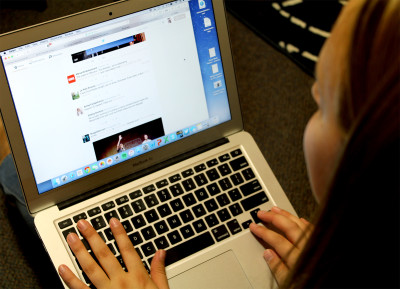
The rise of social media has served as a catalyst for many difficult conversations, especially those regarding social behaviors.
The science journal Nature released a feature Wednesday that focused on the impact of “Twitterstorms,” spotlighting gender issues within one of the most male-dominated fields — science.
Lauren Morello, who authored the piece, analyzed the impact of Twitter on scientific fields, as well as the mechanics behind the website itself.
Through various analyses and experiments, Morello established that Twitter activism has successfully opened up a discussion on sexism currently existing in science. The “hard to ignore” social media platform gives users a microphone to voice their opinions regarding an issue.
“[Twitter] is a forum to show the hatred and discrimination, but it is also a forum for discrimination to continue,” said Tammy Vigil, a professor in Boston University’s College of Communication. “You’ve got two sides to this issue that make it very complex.”
One focus of the study was the story of Fiona Ingleby, a geneticist at the University of Sussex. An opinionated male reviewer targeted Ingleby’s research on gender disparities within the transition from Ph.D. to postdoc. The reviewer urged Ingleby to add “one or two male biologists” as co-authors in order to improve Ingleby’s original analysis.
Ingleby turned to Twitter to express her disgust with the reviewer’s comments and after getting more than 5,000 tweets of equal outrage from both men and women, she was issued a public apology from the reviewer.
Tyler Bordick, a sophomore in COM, said he thinks an apology is a step in the right direction.
“Twitter can certainly cause a snowball effect and gain traction simply because it’s a broadcast to a large group of people,” he said.
Bordick went on to say that Twitter can often be looked at as more of a resource than a social media-based platform because it’s full of opinionated statements and reactions to news. In this way, it gives users an opportunity to better understand or discuss important topics.
The discussion of misogyny in science is nothing new, Morello said. Related comments have almost always been made in workplaces, but Twitter and other social media platforms give those quiet remarks a loud voice.
The victimization of women has helped spark online movements through hashtags such as #YesAllWomen. The phenomenon behind hashtag activism is considered undeniable by many, simply because the public now has direct access to scandals that public relations managers tend to hide.
“It’s great to offer alternative voices the opportunity to open up, talk about ideas and expose problems,” said Vigil.
Related studies have shown that without secret connotations or underlying motives, direct tweets have still proven to evoke emotional responses and thus have been a perfect platform for issues to go viral.
“The main problem within the science field is just women not being taken seriously enough,” said Jae Bae, a freshman in the College of Arts and Sciences. “I think [social] media is the perfect medium to expose this issue and make it more prevalent.”
Through the public medium, however, this exposure is often split between users with opposing views.
“Twitter becomes a double-edged sword because on one hand, you can put your ideas out there, but on the other hand, anybody can really respond in ways that may not be appropriate, valid or useful,” Vigil said.
Women within the field of science who choose to expose wrongful sexism have received a variety of responses, often ranging from murder and rape threats.
According to Morello, Matt Taylor, a scientist who worked at the Rosetta space exploration project, wore a shirt decorated with “scantily clad women” while he was interviewed by many reporters. His suggestive shirt stirred up a controversy regarding the distasteful representation of women and when journalist Rose Eveleth responded with anger via Twitter, she became a target for death threats.
Negativity aside, women are also inspired by the supportive battle cries heard around the web in honor of them, Morello said. When women are verbally abused on Twitter, many acknowledge the reactions of those who have been in similar situations and feel as though they are more able to speak out.
“You could say you’re being oversensitive … and it could be dismissed,” Vigil said. “On the other hand, you could say, ‘Why don’t we think about this a little more? Why aren’t these women treated the same way as the men?’”





















































































































